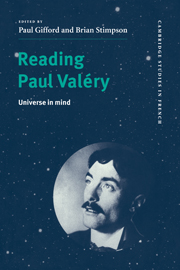Book contents
- Frontmatter
- Contents
- Contributors
- Abbreviations
- Introduction
- PART 1 SELF-SCIENCE
- PART 2 SELF-WRITINGS
- PART 3 BODY, MIND, WORLD
- 13 An aesthetics of the subject: music and the visual arts
- 14 Politics, history and the modern world
- 15 Valéry and the feminine
- 16 Dream and the unconscious
- 17 Self and other: Valéry's ‘lost object of desire’
- Conclusion
- Bibliography
- Index
- Cambridge Cultural Social Studies
14 - Politics, history and the modern world
Published online by Cambridge University Press: 04 August 2010
- Frontmatter
- Contents
- Contributors
- Abbreviations
- Introduction
- PART 1 SELF-SCIENCE
- PART 2 SELF-WRITINGS
- PART 3 BODY, MIND, WORLD
- 13 An aesthetics of the subject: music and the visual arts
- 14 Politics, history and the modern world
- 15 Valéry and the feminine
- 16 Dream and the unconscious
- 17 Self and other: Valéry's ‘lost object of desire’
- Conclusion
- Bibliography
- Index
- Cambridge Cultural Social Studies
Summary
Although a key aspect of his thinking, Valéry's political writings have been studied less than the rest of his work. No doubt this is partly because their more public appearance came relatively late in his career, when he was called on to respond to particular events. Valéry's project was in essence philosophic and psychological; yet it could not but encounter the real world. The little-known notes in the Cahiers on the topic, which Valéry grouped under the heading H[istoire] P[olitique], taken together with the writings published between the wars as Essais quasi politiques and Regards sur le monde actuel, may however be seen to tackle important questions and to establish his reputation as a major political thinker.
These studies, it is true, are not always fully developed and certainly no single overall political doctrine emerges. The writings are fragmentary, conditioned by circumstance and date from different periods; yet they fully reflect both the upheavals of half a century and Valéry's own characteristic approach. While his starting point may be a particular situation, Valéry deliberately seeks a generalising and more theoretical view of politics which is often linked to abstract, and, especially, scientific models. His intention is less to predict the future of nations, than to reflect upon issues such as equality, the organisation of power, economic warfare, the growth of industrialisation, the development of communications, the crisis of values, nationalism, and so on.
- Type
- Chapter
- Information
- Reading Paul ValéryUniverse in Mind, pp. 236 - 250Publisher: Cambridge University PressPrint publication year: 1999

